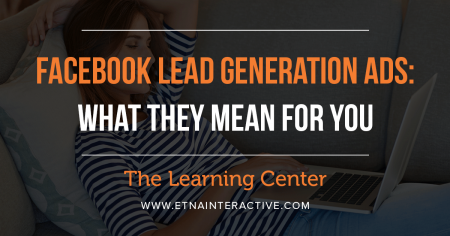
In social media’s evolving climate, advertising methods on platforms such as Facebook change weekly. One of the latest developments in this area has been the implementation of lead generation ads, a form of ad that allows interested users to click on an ad, fill out a short form, and submit their lead information all within the Facebook platform.
If you keep up with social media and online advertising, you may be familiar with these ads — they caused quite the stir at their onset last fall. Although Facebook is still perfecting this ad type, it’s already proven to be an effective method for advertising and collecting leads for many of our clients, as well as advertisers in a variety of other industries. Because they’re still relatively new, we thought we’d tackle some common questions about them.
What are they?
Lead generation ads appear like other “click to website” ads on Facebook, with a “Sign Up” call-to-action in the corner of the ad. When it’s clicked, a form with fill-in blanks pops up requesting information from the user, such as name, email address, phone number, and up to 3 custom questions the advertiser can include when the form is created. The user also has the option to read more about the service by clicking on a URL that leads to an external site or reading a short paragraph from the advertiser that can be included when the ad is created.

Where do they appear?
These ads appear in a user’s news feed. Typically, you’ll want to target your ads toward a specific audience that is more likely to sign up for the service you’re promoting. The advertiser can control whether the ad shows up on mobile feeds, desktop feeds, or both, although the ad will look a little different depending on the device.
Why would you choose them?
Why not just send users to the “Contact Us” page of your website? One of Facebook’s main goals is to prevent users from leaving the platform. By creating this type of ad, users are encouraged to stay on Facebook while still giving advertisers the ability to gather user information. The lead form loads quickly within the Facebook app or page, so users don’t have to wait for a new web browser page to open, which they may quickly abandon.
When a lead generation ad is clicked on, Facebook automatically generates the requested information, pulling information from the user’s Facebook name, associated email address, and phone number. This unique feature allows users to complete and submit the form in a matter of seconds and avoid any extra waiting time that may cause them to abandon the form, so it’s a win-win for the advertiser and for Facebook!
Anytime throughout the course of the ad run, leads can be downloaded and contacted, and ad performance can be measured up to the minute.
How will you benefit?
The lead generation ads are created to foster a quick and easy process, so they’re most effective in collecting leads for services that need little explanation, such as a simple consultation request for a popular treatment. With these ads, leads can be collected more effectively than they would be through traditional “click to site” ads, which require load time and a mobile-friendly website.
How much do they cost?
The cost of a lead generation ad depends largely on the desirability of the service advertised and the market in which the ad is run. Like most other Facebook and online ads, your ad will be placed in a bidding war with other ads, so it’ll be shown to users when your ad out-bids others for the same audience.
Interested in learning more about lead generation ads on Facebook? Leave a question or share your feedback about lead generation ads in the comments below. Or, give us a call — we’d love to discuss how lead generation ads can benefit your business.

Leave a Comment